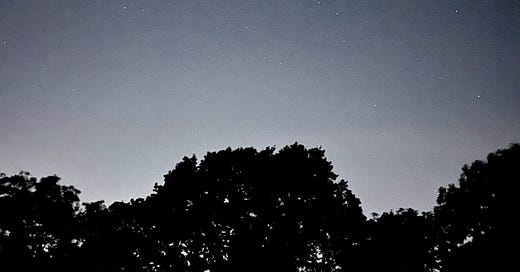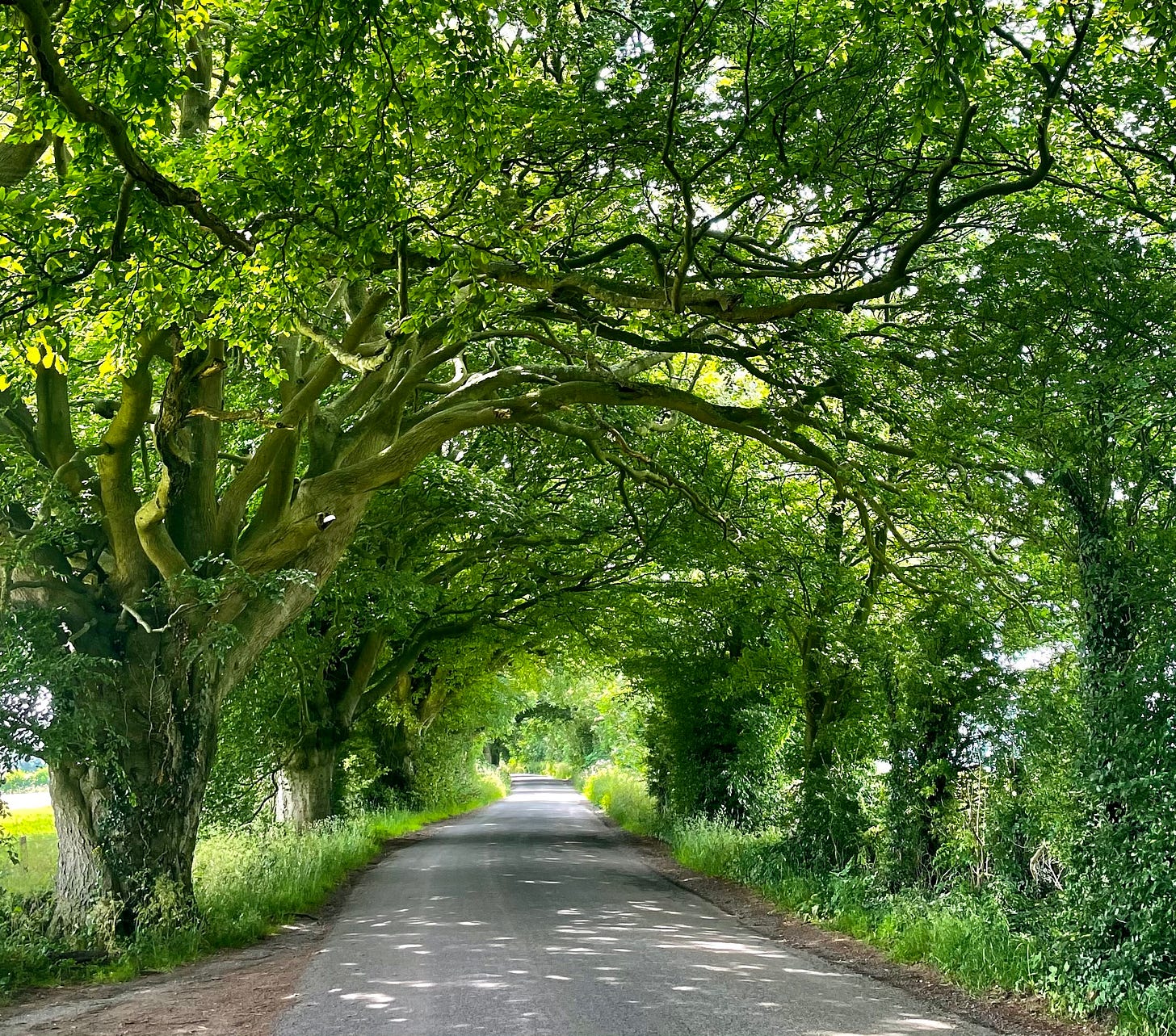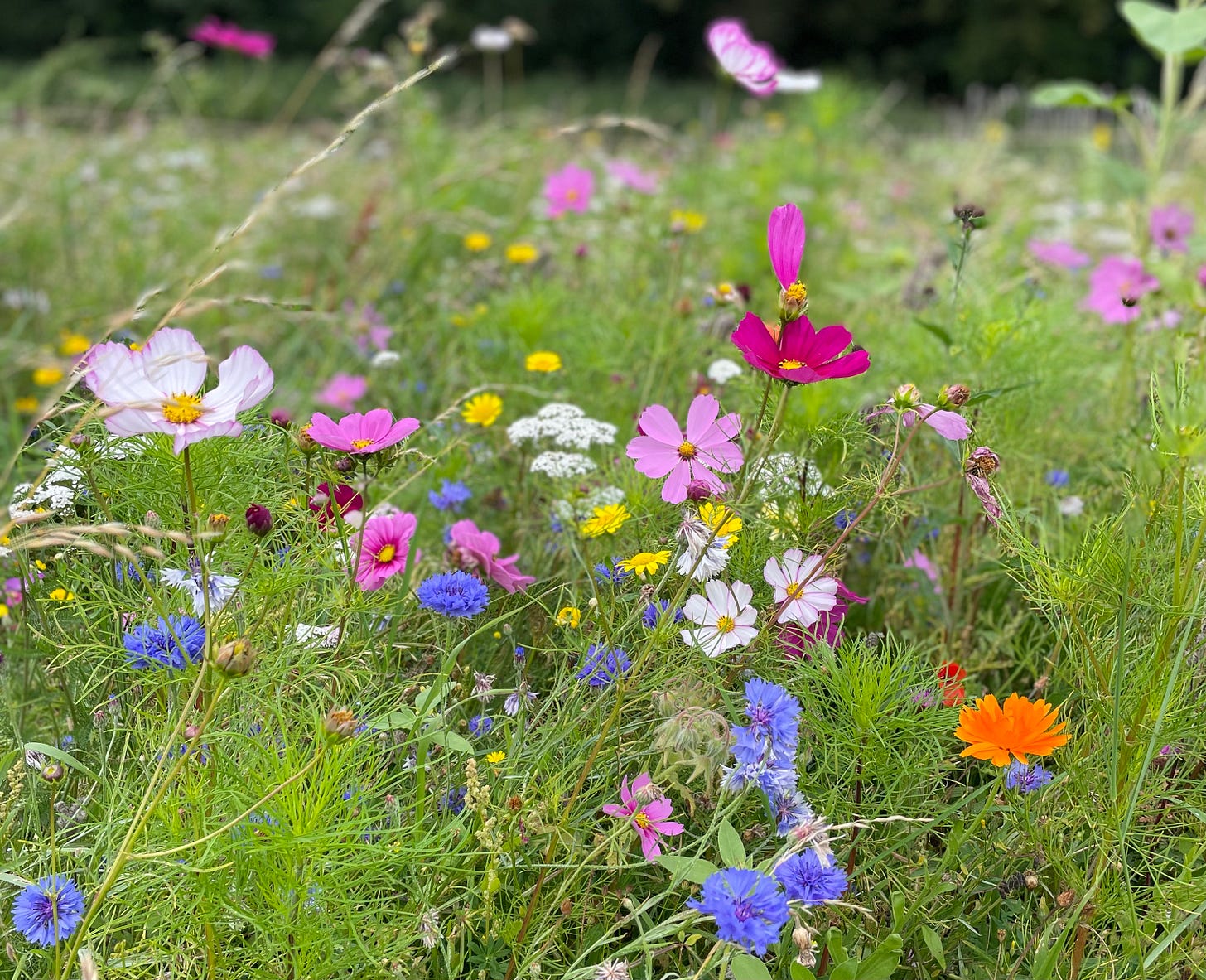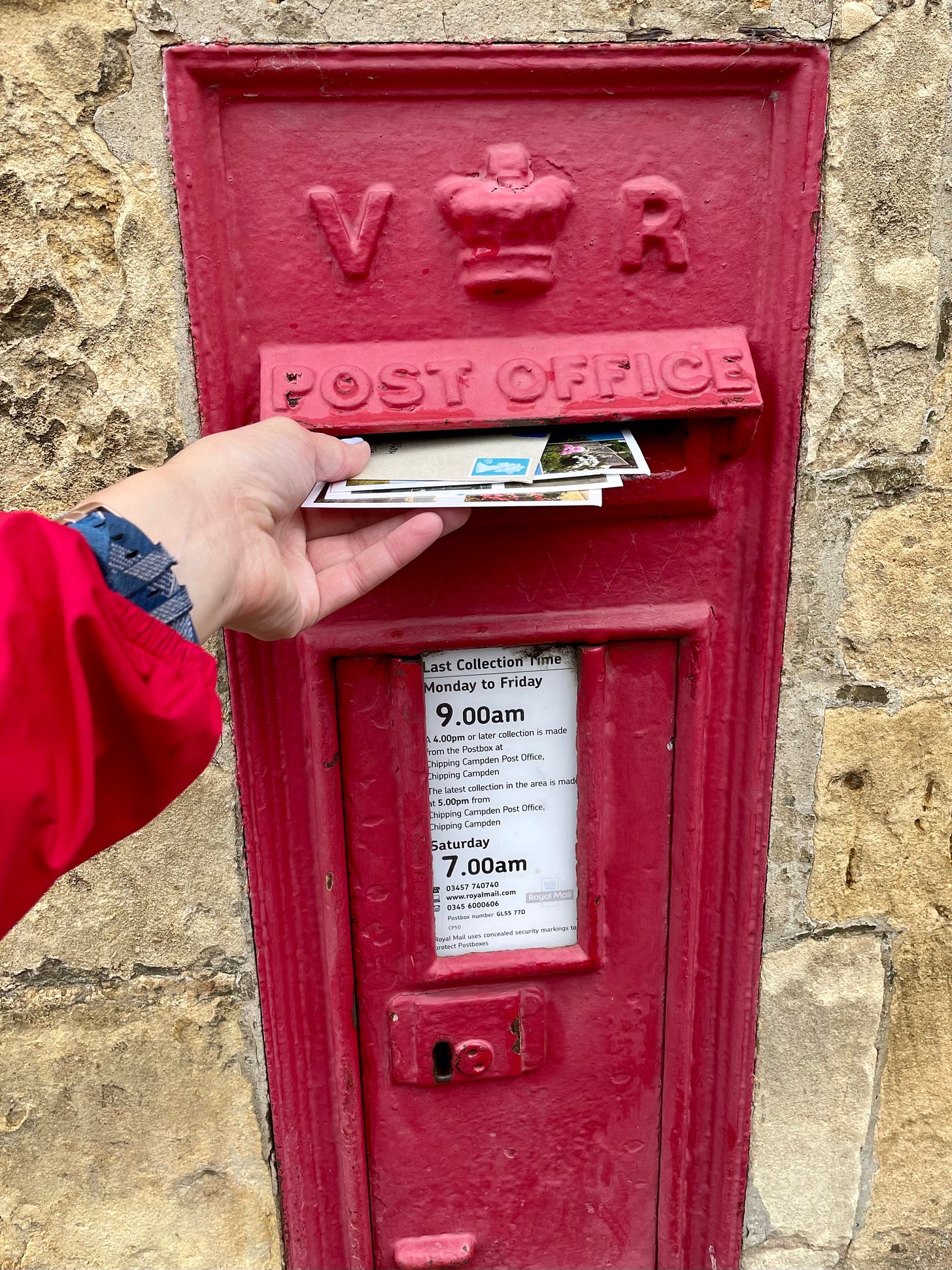Dare to raise your expectations
On shooting stars, light pollution, and allowing yourself to hope for the best.
A few weeks ago, a friend texted around 9 p.m. on a Thursday to say the Perseid meteor shower was about to peak. We checked the forecast, hoped we’d get lucky with a gap in the clouds, and met at some GPS coordinates she’d found for a dark corner of Hampstead Heath.
My expectations were low. I mean, it’s London! It’s the greenest city I’ve ever visited in terms of the sheer number of parks and trees you can find within its borders, but it’s still a city of 9 million people crammed into half the square mileage of Rhode Island, each contributing more than their fair share of light pollution. I thought we might see one.
But just after we spread out blankets in an empty corner of the Heath, marveling at the small handful of stars and satellites that shone through the city noise, we saw a fist-sized meteor streak across the semi-darkness in relative slow-motion. Over the next two hours, between the two of us, we spotted at least a dozen more.
Maybe I’m still just high on the excitement of such magical happenstance, which came about so spontaneously, and on a weeknight, no less. But it felt like a good sign, and an important lesson, for so many things. It reminded me of “The Crane Wife,” an essay CJ Hauser wrote for The Paris Review a couple of summers ago. I’ve read it several times since I first came across it.
The essay is broadly about the “neediness” of humans, but more specifically the shame we cast on the needs of women. So many of us have tried so hard to shrink ourselves so that we are not foolishly disappointed when we ask of others what we would willingly give of ourselves. Days after breaking off an engagement, Hauser finds herself on a research expedition to study cranes, and learns just how little she had allowed herself to hope:
On our way out of the reserve, we often saw wild pigs, black and pink bristly mothers and their young, scurrying through the scrub and rolling in the dust among the cacti. In the van each night, we made bets on how many wild pigs we might see on our drive home.
One night, halfway through the trip, I bet reasonably. We usually saw four, I hoped for five, but I bet three because I figured it was the most that could be expected.
Warren bet wildly, optimistically, too high.
“Twenty pigs,” Warren said. He rested his interlaced fingers on his soft chest.
We laughed and slapped the vinyl van seats at this boldness.
But the thing is, we saw twenty pigs on the drive home that night. And in the thick of our celebrations, I realized how sad it was that I’d bet so low. That I wouldn’t even let myself imagine receiving as much as I’d hoped for.
It’s been a while since I’ve sent this newsletter, and there are a hundred thousand reasons for that. The main one, honestly, is that I just let it get away from me, and it’s been harder and harder to sit down and write it. There were so many things to say, and I got busy with moving back across the world and trying to settle back into a life from six months ago that no longer existed in the way I left it. Then there were too many things to say, and then I felt I’d just never catch up. I often feel overwhelmed and then guilty for the paralysis that ensues, since my job looks absolutely nothing like anyone else’s in my life. I have busy days and then empty weeks and I work sometimes at 3 a.m. Eastern Time, and sometimes at 3 a.m. BST, in the actual timezone I’m living in. Nearly all my friends in London, and most of my friends back in the U.S., too, have full-time, 9-to-5 sorts of jobs and I often feel inadequate in comparison, spending my days trying to figure out what it is I’m supposed to be doing instead of whatever it is I want to be doing.
It’s been harder than I expected to transition back into life here after spending five more months in Rhode Island and Colorado than I planned when I left London last December. I wrote articles this past winter about happiness and resolutions, in which I quoted professors on the fable we all buy about the “pursuit” of happiness. You’ll never be happy if you think you’ll be happy when you get a new job or when you buy that new house or when you find a partner, or when you lose 10 pounds, they said. And even as I understood their lessons, that the only way to be happy is to find ways to embrace what is in front of me instead of constantly reaching for something different, I still told myself I’d be happier when. I’d be happier when I made it back to London, when I’d finally sorted out all the stuff in Boulder that I thought was holding me back, when I took some time off, when I finally felt like I had arrived and settled in. And then I came back here and discovered that everyone else lived on while I felt like I had held my breath. It’s a small miracle my friends are still talking to me, after all the babbling I did about London this and London that and when I go back to London…
I’ll be happy when is a lie we tell ourselves to pass the blame for our feelings onto our circumstances. The trouble is, even when the circumstances change, we stay the same. So we might think we’ll be happy when we move, or quit our jobs, or take a vacation, but if we’re not changing our attitudes along with our circumstances, external factors aren’t going to lead to lasting satisfaction.
There is so little we can actually control in our lives, as we all know now after surviving 18 months of a world we never imagined. But we can prioritize finding small miracles of everyday magic that are lovely and meaningful and keep us going amid massive transition and uncertainty.
I cannot pretend to be an example of how to do this perfectly. In late June, I got a spell of food poisoning that coincided with a spiral of loneliness and depression unlike anything I’ve ever experienced. I spent an entire week on my couch, FaceTiming only with my mother, eating nothing, feeling lonelier and more lost and aimless than I ever had in my entire life. I had moved across the world into yet another temporary living situation, with no significant plan, no idea where I would be living in three months let alone a year, and I had made little progress on the creative goals I’d set out at the beginning of the year. I was worried I was taxing my friends, that I was a burden, that everyone wanted me to just get over myself. (And how self-absorbed is that, thinking that other people would wake up in the morning and think about how I’m a failure?) I wanted to curl into a ball and hide under a desk where no one would be able to see me failing. I didn’t want to bring anyone down, but then I told a couple of friends that I just hadn’t been feeling OK, and something amazing happened: They still loved me. They understood. They showed up for me. And then I started feeling better. One basically told me I was insane to be so worried about sharing that I had been feeling sad, so afraid I’d ruin the relationship by being too much of a downer. “No,” he said, almost scolding. “Expect more from people.”
The next day, I set off for a 100-mile walk through the Cotswolds, a charming part of England that looks as it did hundreds of years ago. Stone cottages dripping with ivy and window boxes bursting with flowers. Pastures teeming with sheep and cows. Muddy trails winding around mossy tree trunks traders and robbers and royalty have traversed over centuries, if not millennia. Every day, I wrote a postcard or letter to my parents and one to myself, which I mailed back to my flat in London. I recorded mini “podKassts” for a friend called “All Cows Considered” about the bovines who stood between me and the gates to the next pasture. I turned off my phone for hours and days at a time, lingered in fields to read books and daydream, to write letters and journal and jot down the beginnings of short stories—things I hadn’t done in earnest in months. My mind still felt like a whirlwind of emotions and personal failures, but I found tremendous comfort in moving forward even as I thought in circles.
On the last day of my hike, I wrote a draft of a philosophy of life, which a psychology professor told me in February is a way for people to find more happiness and contentment in their lives. This isn’t a list of I’ll be happy when’s. It’s composed of what’s important to you, what makes life worth living, and principles and communities and hobbies you love that also happen to bring you satisfaction and happiness, so that you can live by it and lean on it when everything else in life gets chaotic. It’s important to me to keep in close touch with my family, to be kind to others, to stay curious and ask questions and learn through reading, to write things because I want to and not just because someone is paying me to string the words together.
A lesson I often have to relearn is that nothing ever goes the way we will expect it to, and the best we can do is just to do what we can with with we have.
Even more striking than the number of shooting stars we saw from a park in one of the world’s biggest cities was how few other people there were. We heard voices off in the distance but from 11:30 p.m. till nearly 2 a.m., we saw only a couple walking a dog—there wasn’t a single other stargazer in either of the sections of the park we meandered. And Hampstead is massive.
How was it possible, we wondered, that in a city of 9 million people, no one else had come out to hope with us?
To put it mildly, 2021 has been as hard or harder than 2020 for so many of us. It has been fraught with all the “nesses” you never want: aimlessness, illness, loneliness, indecisiveness. Our news headlines have been full of we’ll be happy whens. When we’re all vaccinated, when life “goes back to normal,” when we don’t need to wear masks anymore. When, when, when. But what I’ve also learned through all of this is that we can still find ways to experience joy amid all the chaos.
So, for the next chapter, here’s to being bold and optimistic, and to trying to do the best we can with whatever we end up with. Here’s to consciously seeking little magical moments every day—the way the light catches the moss on a tree trunk, the kindness of a stranger who offers you an umbrella before a downpour, that incredible feeling when you meet someone you don’t have to explain yourself to, the contagious joy of an ecstatic puppy you meet in a park and how impossible it is not to smile and laugh when they let you pet them and scratch their ears, the sense of calm that comes with a good long walk, the simple but satisfying click of a loose brick on a walkway, wildflowers where you least expect them, getting the last cinnamon bun at the cafe, a friend asking “how are you?” and genuinely wanting to know the honest answer—and appreciating them fully in the moment.
Here’s to hopefulness, and to hoping for more than we expect. I hope you’ll hope, too.









Thank you for your vulnerability, honesty, and contagious positive outlook on the future—much love.
Bravo! Beautiful work. Your insights on making our happiness contingent on some future event are spot on - we just recalibrate our hardwired settings to shift away from this perspective and bring happiness into the here and now.